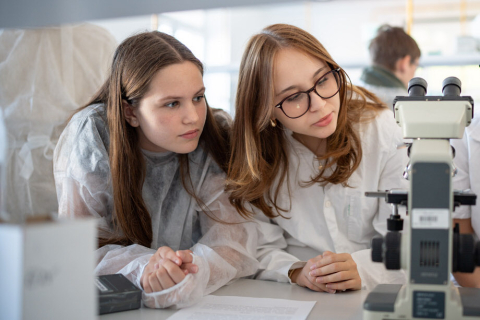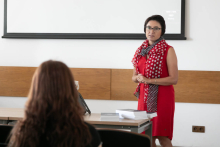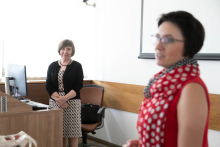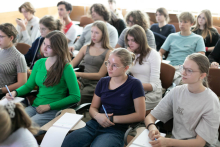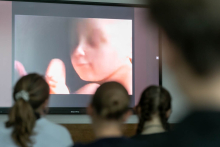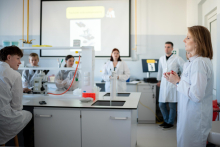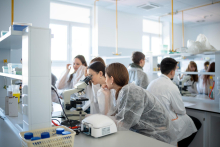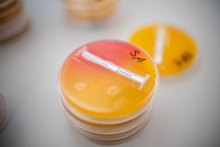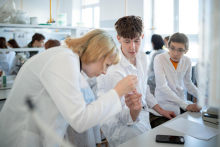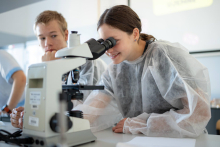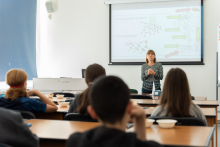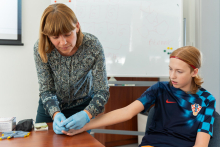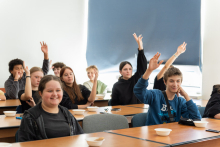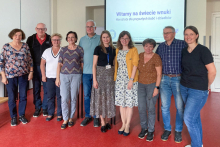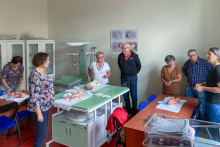The Science Festival in Warsaw is one of the biggest events popularizing science in Poland.
-The driving force of social development is knowledge, and the popularization of science allows us to get to know scholars and increase society’s trust in scientific research - emphasized habilitated doctor Małgorzata Witkowska-Zimny from the Department of Human Anatomy, coordinator of the Science Festival at the Faculty of Health Sciences of the Medical University of Warsaw.
Every year, everyone finds something for themselves in the festival program, regardless of age. Over 400 meetings, lessons and exhibitions awaited participants of the 28th edition.
-Children and youth like challenges and are curious about the world. In turn, older people can learn and better understand ongoing changes in the economy, industry, science and society -said habilitated doctor Małgorzata Witkowska-Zimny.
Lessons for young people
Doctor Sylwia Jarzynka and doctor Anna Minkiewicz-Zochniak from the Department of Medical Biology, supervisors of the ‘AGAR’ Student Science Club, together with members of the club, invited high school students to a microbiology laboratory. During classes ‘Attention! Or the sanitary inspectorate will call!’ the youth made preparations from swabs aken from their own mobile phones, among others, and then could observe the samples them under the microscope. The aim of the exercise was to show how diverse and often underestimated the world of microorganisms is, as well as to make people aware of how many microorganisms there are around us – on our skin, in the air, on everyday objects.
-Some of the microorganisms surrounding us belong to the group of pathogens that cause diseases in humans. It is very important to provide early education and sensitization about hygiene in order to prevent the transfer of pathogenic microorganisms to people with compromised immunity, who are increasingly numerous in our environment, for example, seniors, cancer patients or people after organ and hematopoietic cell transplants-explained doctor Sylwia Jarzynka.
-Conducting educational classes for young people, especially practical in nature, is very satisfying. Without the burden of tests and other exams, young people approach classes more lightheartedly and with greater and curiosity. They perform tasks willingly and enjoy the experimenting and discovering - added doctor Anna Minkiewicz-Zochniak.
She also emphasized the importance of cooperation of students from the ‘AGAR’ Student Science Club, who co-author the festival’s lessons and, playing the role of lecturer, pass on knowledge to young people in an attractive way.
Biology classes for high school were also conducted by habilitated doctor Grażyna Bączek from the Department of Gynecological and Obstetrics Teaching, who talked about human development and birth and how unusual this process designed by nature is. Our expert talked about the fertilization process, intrauterine development and human birth. Not only from the point of view of biology and physiology, but also in the psychological and sociological aspects.
In turn, students of the last grades of primary school took part in a lesson titled ‘Blood sugar? Is it normal?’. An important topic due to the high prevalence of diabetes among adults and the increasing incidence of diabetes among young people. Doctor Ewa Kobos, doctor Zofia Sienkiewicz and master Alicja Szewczyk from the Department of Development of Nursing, Social and Medical Sciences presented during the classes the physiology and pathophysiology of carbohydrate metabolism disorders in the human body, and also presented activities for the primary prevention of diabetes that students can introduce into their lives. The lesson was co-hosted with the Polish Federation of Diabetes Education.
-Extracurricular forms of education and gaining knowledge through experience promote creativity and motivate young people to act independently and seek their own paths of development - said habilitated doctor Małgorzata Witkowska-Zimny.
Workshops for all interested
Doctor Zofia Sienkiewicz also invited guests to two open workshops. The first one concerned the prevention of urinary incontinence which is still an embarrassing problem for many women, which significantly deteriorates quality of their lives, makes them give up work or limits their social contacts. The second workshop, devoted to pressure ulcers, during which she discussed the prevention and methods of treating this ailment in patients immobilized at home, explained the causes and mode of development of pressure ulcers. During the workshops there were also practical exercises on attending patients with such lesions.
Habilitated doctor Grażyna Bączek once again shared her knowledge from the overlap of biology and health sciences during the workshop titled ‘From conception to birth – helping a baby come into the world’. The classes were interactive, with the use of models and phantoms. The aim of the classes was to present in the most accessible way issues such as reproductive health, pregnancy, childbirth, postnatal period, human development, newborn care and breastfeeding.
Workshops were also organized for grandparents-to-be and actual. Workshop participants could learn, among other things, what new trends are in perinatal care, what postnatal period depression is, how to support breastfeeding mothers, how to talk to young parents so that they want to listen and don’t feel overwhelmed.
The presenter, habilitated doctor Małgorzata Stefaniak from the Department of Gynecology and Obstetrics Teaching, explained: -As midwives and midwifery students who take care of women in the delivery room and in the maternity ward, every day we meet not only parents of newborn children, but also grandparents who come to visit. We see how they get involved in caring for the little ones. Sometimes they ask us questions, sometimes we hear them giving advice to young parents. We know how different today’s realities are from those of twenty, thirty or even forty years ago. This is where the idea of running educational workshops for grandparents was born.
As emphasized by habilitated doctor Małgorzata Stefaniak, the desire to support young parents in the period immediately after the birth of a child has not changed, as their joy of the arrival of the little person is mixed with the feeling that their life has been ‘turned upside down’. That is why it is so important to provide grandparents an opportunity to obtain the latest knowledge and practical advice so that their support is satisfactory for all parties.
- Learning is a continuous process and independent search and acquisition of knowledge plays an increasingly important role. The Science Festival not only fits into the idea of lifelong learning, stimulates educational activity of seniors, but also allows them to integrate with other participants of educational events and gives them a sense of belonging to a group of conscious participants of social life - summed up habilitated doctor Małgorzata Witkowska-Zimny, coordinator of the festival at the Medical University of Warsaw.
The 28th edition of the Science Festival lasted from September 20 to 29, 2024. Classes at the Medical University of Warsaw were held on September 25, 26, 27 and 28.
